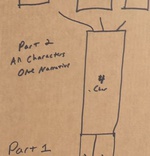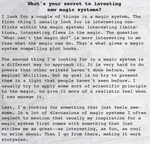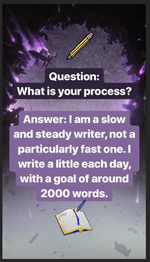Las Aventuras de Erif
How did you decide to turn Taravangian into Odium?
Brandon Sanderson
How did I decide to do that? There are a couple reasons I decided to do that. This was one of the things didn't have to go this way. It is actually a good one I can talk about because I had multiple options here. Even until I was turning in this outline to my team and saying "Alright, it's time to sink or swim, do we like this or not?", I was going back and forth on it. Really until I had written the scenes and given them to my alpha readers and said, "alright, are you guys ready for me to pull the trigger on this?" because there are costs. The major cost is that Odium is a better ancient unknowable evil. Odium was filling the role in the books of Sauron. Ancient thing, very dangerous, very strange, very powerful and whatnot.
The thing is, my books aren't really about that. I will write books dealing with some of that sort of stuff, but that's not the sort of thing that is as exciting. It's not really as much a theme of my stories, the ancient unknowable evil. The whole purpose of Mistborn—one of them, it's not the purpose—is that even the Lord Ruler you've got to know. Even Ruin became a character that you understood. It is a cost, I will admit. It wasn't as strong for me as it might have been somewhere else. I do know that some people would prefer that, and I can understand why. Sauron makes a pretty great bad guy. Ancient, powerful, unknowable, evil forces—but I feel like I get that in the Shard itself. One of the things that I plan to play up more as the Cosmere goes forward is that these powers have some sort of primal sense to them. That's always in my mind been the bigger danger than than Rayse is that.
That is, the negatives were not that big of negatives. And what are the positives? In Oathbringer, Dalinar did not fall to Odium. That is a huge blow to Odium, Rayse-Odium. The fact that at the end of book three he was defeated in a major way, and in book four he gets defeated again, this time by Kaladin. We have proven that two of our primary viewpoint protagonists of the Stormlight Archive are able to resist and defeat him. My opinion was that by that point in the Stormlight Archive, Odium would no longer, Odium-Rayse would no longer be a threat. You run into this in lots of long running epic fantasy series. I've talked a lot about how when I was designing Stormlight Archive, the things I had read in other long running fantasy series were a big part of why I designed it the way I did. For instance, in the Wheel of Time it was very difficult—even in the ones I was writing—to maintain a sense of threat for the Forsaken when they had just been defeated right and left every book. They do get their licks in now and then, but it's real hard to keep considering Ba'alzamon from the first one to be a threat when boy, Rand just defeats him and defeats him again and defeats him again and then defeats him again. This is a problem for a lot of media. How threatening is Magneto really when he never wins?
At this point in the series, what I wanted to do was hit you with a left hook from somebody that I considered more frightening, more dangerous, more capable, and who had been growing as an antagonist for a while. And while some of his ploys had not turned out, he is still very threatening. My hope was that this reveal to a portion of the audience—I knew that some would prefer Odium, but to I hoped a larger portion—would be like, "Oh, this just got real."
I've mentioned before that my favorite antagonist is Magneto, I've brought him up before. I like characters who have clashes, antagonists who have clashes of ideology, not just clashes of forces. A reason I'm not excited to write about somebody like Sauron is that, while there are clashes of ideology behind the scenes, on screen for the movies and books it's basically: Sauron wants to rule the world and we don't want him to. That works really well in Lord of the Rings because you have, as I've talked about, part of the brilliance of the Lord of the Rings is both having Sauron, Saruman, and Gollum to represent three different kinds of evil and three different antagonists that work in tandem really well together. It's part of the brilliance of the Lord of the Rings. But I like having a villain like Taravangian. Taravangian, who has a world view that is a certain world view and that is terrifying because of how that world view is. Elevating him to Odium so that you mixed that with the kind of ancient spren of hatred that is still a very big, dominant part of what he's now become—I just thought made for a more compelling and interesting villain for the fact that we have many more books left in the Stormlight Archive and in the Cosmere, and I had done what I wanted to with Rayse-Odium.
There's my answer. It is totally viable to have, viable is the wrong term, totally understandable that some would have preferred me to go a different direction, but my instinct says—and I haven't done any polls or things on this—that the majority of fans are going to like this direction better, and I certainly think the story will turn out better. That's what led me to make that decision, but these were all things I was heavily considering. Adam was there watching those emails go around with me and the team when I was asking if I should pull the trigger on this or not. There are a couple of things that I've made decisions on that have been some of the most difficult or most far-reaching in that regard, but that I think I made the right decision on.
The other one was bringing Kelsier back. Kelsier, so I seeded all the stuff in the original books to bring Kelsier back, but then I backed off on it, and for a while I'm like eh, I don't think I'm going to bring Kelsier back. During that whole thing, oh this is a fun spoiler thing that I don't think I've talked about before: during that time in the outlining—some of you may again have much preferred this—TenSoon was actually going to be Thaidakar, wearing Kelsier's bones. There was a time where I was going to play with a kandra believing they were Kelsier, in this case TenSoon. I was going to go this direction where it's like, I'm the Survivor, I'm picking up the Survivor's heritage and I'm doing all of this sort of stuff—I did warn you all about spoilers—and there was a time in there where I decided no, I'm going to leave Kelsier dead—that I'm going to go this direction. Why did I back off on that one? A couple reasons, number one I feel like I really did a solid job with Lessie in the second of the Wax and Wayne books, which was a similar conflict. I felt like I got that out of my system. I did it well, I think that story has some really heart-wrenching things, but as I wrote that story I felt that it was a one-book story.
One of the things I've come to be aware of as I've written, this stretches back to the days of Elantris where my original ending had too many twists. It's been changed, like I had some weird twist where Hrathen had secretly come to Elantris at some point and had a heritage that made him Aleth—not Alethi—made him Aonic and things like that and it was dumb and it didn't work. It was twisting for twists sake. And part of me worries, and part of me actually doesn't just worry, I think that if I had done that whole thing with TenSoon it would have been less cool than what I just actually wanted to have happen, which was to give a full finished character arc to Kelsier. At that point I went back to what my original plan had been and I picked up those threads, and that's when I wrote Secret History, after I had finally made that decision. And it comes with costs too. Everything comes with costs. Having main character die in such a spectacular way and then not being quite dead yet has certain costs in your narrative. The more you do that less that death is meaningful in the stories, the more it feels like a gotcha and things like that. Yet at the same time on the other side, I don't think the Lord of the Rings is weaker for having brought back Gandalf. I think the Lord of the Rings is stronger, and why is that? Gandalf comes back changed as a different person and makes the story more interesting for having returned. My original plan with Kelsier was just more interesting in the long run. Forcing Kelsier to do these things and fi—he did not complete his character arc, and that's part of why it was so heart-wrenching to lose him, which I understand. Bringing him back in that regard lets me finish his story, and I just think that's going to be more satisfying. I gain more than I lose.
Plus there's the fact that someone comes back from the dead in the first chapter of the very first Cosmere book. Second chances at life is a major theme of the Cosmere. Both Warbreaker and Elantris that's kind of—Warbreaker it's the primary theme: second chance at life. You're doing a different thing with your life than you thought you would do, and let's take a second stab at it. I think that being able to play with that with Kelsier is a stronger narrative thing to do. This was also influenced by my, as I've talked about before, sort of shrinking the timescale a little bit of the Cosmere so that more of the characters from the different books can interact. It just makes better storytelling. I would say that those are the two things that in outline I could have gone different directions when I actually got to the story. When it was time to write Secret History I had to make the call. He had been dead, he had been alive, he had been dead, he had been alive, at least in my head, and I made that call. The same thing actually happened with Taravangian. It had been am I going to pull the trigger, was he going to become Odium or not? I actually vacillated on that and eventually have made the decision I made.
Adam
Are you ever going to reveal what the alternate was going to be, kind of like what you just did?
Brandon Sanderson
Maybe eventually I will, but for now I will not. It's easier to reveal in Mistborn because it's basically all in the past. It isn't to say that I won't do something else like that, with a kandra. I might, but Lessie's story covered that real well. Who knows what I'll do, but I've backed off on, for those who have read Way of Kings Prime, Taln's original story was the story of am I an angel or am I not? Am I a Herald or am I not? Am I this divine being or am I a normal person? And that actually plays real well in Way of Kings Prime. It is just not a thing I could make work in the actual published version of Way of Kings. It's one of the things that's cool about Way of Kings Prime, is being able to see some of these ideas that I can't express in the actual series. Part of the reason I can't is also, number one I wanted to bring the voidbringers in and all of these things, and you just can't... The more fantastical your book is, the less the reader will be able to suspend disbelief about your character who claims that they're not some mythological legend from lore actually not being that mythological—they walk onstage and are like, "I think that I'm this mythological legend from lore but my powers are gone." Ninety-nine readers out of a hundred are going to be like, "yep, I believe you", even though all the rest of the people in the books are going to be like, "No of course you're not." The reader—because it's just cooler that way. It's very hard to fulfill on good promises by not having that turn out that way. Beyond that, the story I wanted to tell involved Taln and so big surprise, Taln is a Herald!





